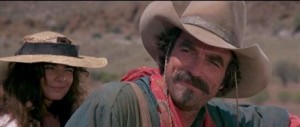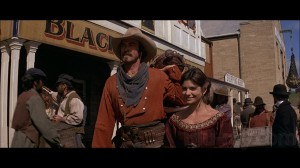From the Chicago Reader (October 1, 1990). — J.R.

Tom Selleck plays Matthew Quigley, the best marksman in the world, who leaves the wild west for Australia in the 1860s to work for a wealthy British cattle rancher (Alan Rickman), until he discovers that his boss is a genocidal meanie who wants to wipe out the aborigines; Laura San Giacomo plays Crazy Cora, another American a long way from home, whom Quigley takes under his wing. In fact, this very old-fashioned liberal western in ‘Scope, directed by Simon Wincer from a script by John Hill, has a hero who’s so superhuman, virtuous, and universal in his appeal — the aborigines, who clearly consider him the Great White Father, call him the spirit warrior — that he makes Roy Rogers seem like both an amateur and a degenerate. Nevertheless, as a kind of winsome and naive throwback to the sort of scenic, action-packed western that people used to believe in, this is fairly enjoyable stuff. (JR)
 Read more
Read more
A skillfully pared-down (if psychologically thin) horror thriller (1990), adapted by William Goldman from a Stephen King novel and crisply directed by Rob Reiner. A best-selling novelist (James Caan), who’s recently killed off his beloved romantic heroine in order to do more personal writing, gets caught in a blizzard, suffers a nearly fatal car accident, and is saved by a fanatic admirer (Kathy Bates) who holds him captive in her isolated house. The setup recalls Martin Scorsese Read more
Frank Sinatra plays one of three paid assassins who take up residence in a California town as part of a plot to kill the president, who’s passing through on a fishing trip. Released in 1954, well before JFK was assassinated, this is a reasonably efficient but fairly unpleasant black-and-white thriller, written by Richard Sale and directed by Lewis Allen. Worth seeing mainly for the actingby Sinatra, Sterling Hayden, James Gleason, Nancy Gates, and others. (JR) Read more
A key work in the American independent cinema, Jon Jost’s first feature (1974) is an essay film devoted to self-definition and moral reckoning. Made on an impossibly slim budget$2,500this multifaceted work includes everything from the tools and preconditions of its own making to Jost’s personal relationships at the time to a cogent political analysis of the U.S. in relation to the rest of the world (Vietnam in particular). Its equally varied technique includes everything from extended takes and elaborate camera movements to liquid, lyrical dissolves and incidental animation. Certain sections are bound to irritate, others may amuse or enlightenbut all are versions of what the title promises, and collectively they have more to say about the 60s counterculture than you could find in a lifetime of TV misinformation. If you’re curious why some critics have called Jost the American Godard, this is the perfect place to find a credible answer. (JR) Read more
Comedy director Carl Reiner is at his lowest ebb in this threadbare effort, scripted by Martha Goldhirsh, about an uptight married older sister (a frenetic Kirstie Alley) and a flaky and footloose younger one (Jami Gertz)derived, it would seem, from the sisters in sex, lies, and videotape. By overwhelming coincidence number one, the older sister has an unprecedented sexual fling with a stranger (Sam Elliott)her husband’s brother as it turns out, expected for dinner that very nightwho then dies of a heart attack; by overwhelming coincidence number two, after the brother’s corpse is discovered by a blinds salesman (a very unfunny Bill Pullman), the salesman’s cop brother (Ed O’Neill) investigates the case and winds up making a match with the flaky sister. Reiner chugs through it all as if he had his mind on something else, as well he should have. (JR) Read more
George Romero scripted and served as executive producer on this 1990 color remake of his own low-budget scare classic, although he left the directorial duties to makeup specialist Tom Savini, making his feature debut here. Aficionados of the original will want to see this in order to notice the interesting variations in both plot and overall emphasis, but this version is a good deal coarser and considerably more bitter than its predecessor. The emphasis on family ties in the 1968 version is supplanted by more noticeable amounts of self-interest and cruelty, and purely as a suspense and horror vehicle, this is markedly less effective, largely because of Savini’s detached direction. But the film can’t simply be discounted as a skim job on the original; Romero’s dark social commentary, which grew in impact over his entire Dead trilogy, is still very much present here, even if it no longer has the same bite and urgency. With Tony Todd, Patricia Tallman, and Tom Towles. R, 96 min. (JR) Read more
Not everything one wants it to be, but Mel Brooks’s parody of Hitchcock, in which he plays a psychiatrist, has enough high spirits to guide it over some of the rough and low spots; he does a particularly nice bit singing in a nightclub. If you can put up with his usual hit-or-miss attack, you might find yourself amused. With Madeline Kahn, Cloris Leachman, Harvey Korman, and Charlie Callas (1977). (JR) Read more
A 1990 film by Philip Kaufman (The Unbearable Lightness of Being), coscripted with Rose Kaufman, about the secret affair between writers Henry Miller and Anais Nin in Paris in the early 30s, based on a posthumous book by Nin drawn from her journals. Though the film is stylistically and thematically confused in spotsthe inappropriate references to Jules and Jim help to pinpoint how relatively timid Kaufman’s vision of these erotic writers isthe claustrophobic feeling for the cozy yet dank and smoky Parisian interiors is rather seductive over the long haul. Fred Ward does a surprisingly adept job of impersonating Miller’s vocal and facial mannerisms, Uma Thurman is haunting as Miller’s enigmatic wife June, and Maria de Medeiros is sensuous in a particularly 30s manner. The film never seems to understand these three in spite of all its fascination with them, but if Kaufman’s art-movie reflexes never quite add up to a sustained style or vision, this is still a fairly sexy and charming outsider’s view of bohemian passion. (JR) Read more
Preston Sturges’s last feature for Paramount (1944) takes on wartime patriotism with a brio and vengeance that may take your breath away. Woodrow Lafayette Pershing Truesmith (Eddie Bracken) gets discharged from the marines due to chronic hay fever, but some service buddies decide to present him to his hometown as if he’s a returning war hero. As usual, Sturges’s stock company of wonderful bit actorsincluding William Demarest, Franklin Pangborn, Raymond Walburn, and Jimmy Conlinis orchestrated and conducted like a pop symphony, and Ella Raines does duty as the love interest. A scathing delight. 100 min. (JR) Read more
A refined 27-year-old yuppie (James Spader) in Saint Louis, still grieving over the death of his wife in a car accident, gets involved in a passionate affair with an aggressive 43-year-old waitress (Susan Sarandon) at a White Palace hamburger joint, and their class differences pose even more problems for them than their age difference, especially when the yuppie’s mother and friends come into the picture. Neither character is especially well defined, particularly if one discounts the strident overdefinition of their respective milieus, but as an old-fashioned Hollywood romance in which anything can happen, this is reasonably watchable, and at times mildly funny. Adapted by Tedd Tally and Alvin Sargent from a novel by Glenn Savan, directed by Luis Mandoki (Gaby–A True Story), and costarring Jason Alexander, Kathy Bates, and Eileen Brennan (1990). (JR) Read more
A charming period comedy set in 1962, chiefly during the Cuban missile crisis, written and directed by Christopher Monger and produced by the enterprising Edward R. Pressman. A single parent (Teri Garr) who lives with her semidelinquent kids (Hillary Wolf and Colin Baumgartner) and magician aunt (a relatively subdued Shirley MacLaine), whose influence often gets the kids into trouble, leaves Chicago for a small town in Washington after she inherits a run-down diner. After a scrape with their reclusive next-door neighbor (Vincent Schiavelli, a dead ringer for underground actor Taylor Mead), the kids and aunt secretly take revenge by manufacturing a miracle that the local community takes seriously, turning the diner into a thriving tourist location. Unfashionably leisurely and depending more on character and ambience than on plot and action, this is a pretty agreeable old-fashioned sort of picture, attractively shot by Gabriel Beristain. (JR) Read more
A disconcerting (if occasionally intriguing) mixed bag, this Americanized adaptation of Mario Vargas Llosa’s Peruvian novel Aunt Julia and the Scriptwriter has been transplanted to 1951 New Orleans by scenarist William Boyd. Directed by Jon Amiel (The Singing Detective, Queen of Hearts), the film suffers from a truly awful performance by Keanu Reeves as a reporter and aspiring literary writer who becomes involved with his worldly aunt (Barbara Hershey) and falls under the spell of an eccentric radio soap-opera writer (Peter Falk) who likes to manipulate reality in order to feed his own fiction. Falk has been encouraged to ham it up so shamelessly that even fans like myself are put to the test; the period flavor is uncertain, Wynton Marsalis’s score is disappointingly mediocre, and the film’s eagerness to milk laughs from the scriptwriter’s loathing of Albanians seems tacky and facile. What the movie has going for it are the freewheeling crossovers between fiction and reality that also sparked The Singing Detective and which the film generally handles with wit and imagination, as well as Hershey’s touching effortsvirtually at odds with those of the rest of the castto play a believable character. Otherwise, this movie tends to assault you like a hysterically affectionate Chihuahua, daring you to either recoil or capitulate (1990). Read more
By reputation, one of the Disney studio’s feeblest efforts (1977). Set in Maine in 1900, it features a live-action boy and an animated dragon that no one but the boy can see. (DK) Directed by Don Chaffey; with Helen Reddy, Jim Dale, Mickey Rooney, Red Buttons, Shelley Winters, Sean Marshall, and Jim Backus. Read more
This Mexican feature by Emilio Fernandez, based on John Steinbeck’s novel about a poor fisherman, is best known for its remarkable black-and-white cinematography by the masterful Gabriel Figueroa; with Pedro Armendariz and Maria Elena Marques (1948). (JR) Read more
The Coen brothers’ lush gangster melodrama (1990, 115 min.), set in an unnamed eastern city in 1929. Self-conscious and show-offy, with more portent than soul, the film shows some progress over the Coens’ earlier effortsif only because of the allure and energy of the cast. Yet it never fully convinces in terms of either period or plot. Gabriel Byrne plays an Irish gangster and pal of Irish city boss Albert Finney, and the two of them split over a Jewish moll (Marcia Gay Harden) whose brother (John Turturro) is set to be bumped off; Byrne then goes to work for the Italian kingpin in town (Jon Polito) who has taken over control of the mayor and chief of police from Finney. The novels of Dashiell Hammett were reportedly the main inspiration here, but if much of what’s best about Hammett came from personal acquaintance with his gangster milieu, the Coens’ only acquaintance is with Hammett’s novels. The film’s idea of sophistication is to play Danny Boy while the tommy guns splutter, pile on the gore, light the interiors like kitsch Rembrandts, and punctuate the action with significant fade-outs; the double crosses are so intricate and the cynicism so enveloping that it becomes increasingly difficult to care about the characters, although the actors (who also include the sinister J.E. Read more


